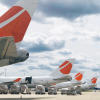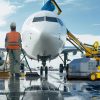 We tend to associate the field of aviation with precision, responsibility, and focus. It all starts with the pilots. It would be hard to find a more high-stakes profession. After all, pilots are the ones responsible for ensuring the safety and well-being of passengers. In other words, the very act of dreaming about this job indicates a certain level of ambition. So how do you get there? Experienced pilots know that it all starts with being physically fit and mentally tough.
We tend to associate the field of aviation with precision, responsibility, and focus. It all starts with the pilots. It would be hard to find a more high-stakes profession. After all, pilots are the ones responsible for ensuring the safety and well-being of passengers. In other words, the very act of dreaming about this job indicates a certain level of ambition. So how do you get there? Experienced pilots know that it all starts with being physically fit and mentally tough.
Talking to aspiring pilots is part of the job of Gina Chormanskiene, Head of Competence center at BAA Training. According to her, young people often ask him what qualities a person in charge of a plane should have. The answer is always the same.
"They expect me to mention courage, adventurousness, high IQ, and similar qualities. The reality is more down to earth. In my opinion, it all starts with understanding that your mental and physical health must come as a priority. This is essential. Once you understand that, everything else follows," she says.
Why it all starts with mental health
Piloting an aircraft is an incredibly complex activity. It requires a sharp mind and sound decision-making skills. Pilots routinely encounter adverse weather conditions and deal with emergency situations. Even the simplest flight puts a strain on the brain. Think of all the complex systems a pilot has to manage even during a normal working day.
According to Mrs. Chormanskiene, it all comes down to a person's ability to manage stress. It directly affects the safety of the flight.
"Demanding schedules, long hours, high-pressure situations are all part of aviation. If you're wondering if you have what it takes to be a pilot, evaluate your ability to handle stress. Stress can impair cognitive function, decision making, and situational awareness. Needless to say, these are all critical in the cockpit," she says.
Pilots must develop techniques for dealing with stress and other negative emotions. So, daily 8 hours of sleep are a must, as well as socializing and maintaining healthy relationships with family and friends. This is especially important because pilots spend long periods of time away from home. This can put a strain on your relationships. Maintaining them can only be done with a lot of care and attention.
It is also important to know yourself. Burnout and mental exhaustion are real dangers. Knowing the first signs and being able to ask for help is a quality of a great pilot. Many pilots meditate and use various mindfulness techniques to better understand their emotions and mental state.
Why physical fitness is a must
Flying is also a physically demanding job. Pilots must remain alert and responsive for long periods of time. This puts a significant strain on a person's body. Mrs. Chormanskiene is blunt – it's impossible to successfully perform your duties as a pilot if you're not in shape.
"There is a good reason why airlines place such a high value on the health of their pilots. Regular checkups and tests aren't just for fun. Poor health puts a pilot's performance in jeopardy and, in turn, puts passengers at risk," she says.
Cardiovascular health and muscular strength are key factors in assessing pilot fitness. Conditions such as high blood pressure, obesity, or cardiovascular disease may even be grounds for revoking a pilot's license.
"Maintaining a healthy lifestyle is key. It includes regular exercise, a balanced diet, and adequate hydration. A healthy lifestyle is a habit. It takes time to develop. The earlier you start, the better. My advice to teens who dream of being a pilot is simple – start taking care of your body now," says Mrs. Chormanskiene.
Finding balance
BAA Training's Head of Competence center also believes that the physical and mental aspects are linked. The better prepared you are physically, the more successful you'll be in dealing with your emotions.
"Regular exercise improves physical fitness and at the same time promotes mental clarity and reduces stress. Meanwhile, meditation improves mental resilience and also lowers blood pressure and reduces muscle tension. So it's all connected. Pilots should focus on both mental and physical aspects," she says.
What is the best way to do that? First, avoid the risks of a sedentary lifestyle. Aspiring pilots should focus on core strength, flexibility, and endurance exercises. A balanced diet rich in carbohydrates, protein, and healthy fats is also important.
At the same time, it's important to protect your hearing and vision. They are critical to safe flight operations. Noise-canceling headsets and UV-protective sunglasses mitigate much of the potential risk. Use these tools now. If you wait for the first problems to occur, it might be already too late.
Taking care of your mental health is also important. Learn relaxation techniques. Identify your top stressors and gain tools to manage them. They will become indispensable in your career.
And most importantly, make these things part of your routine. The most resilient pilots who navigate the skies with confidence do not argue with themselves about these things. They just do them.





